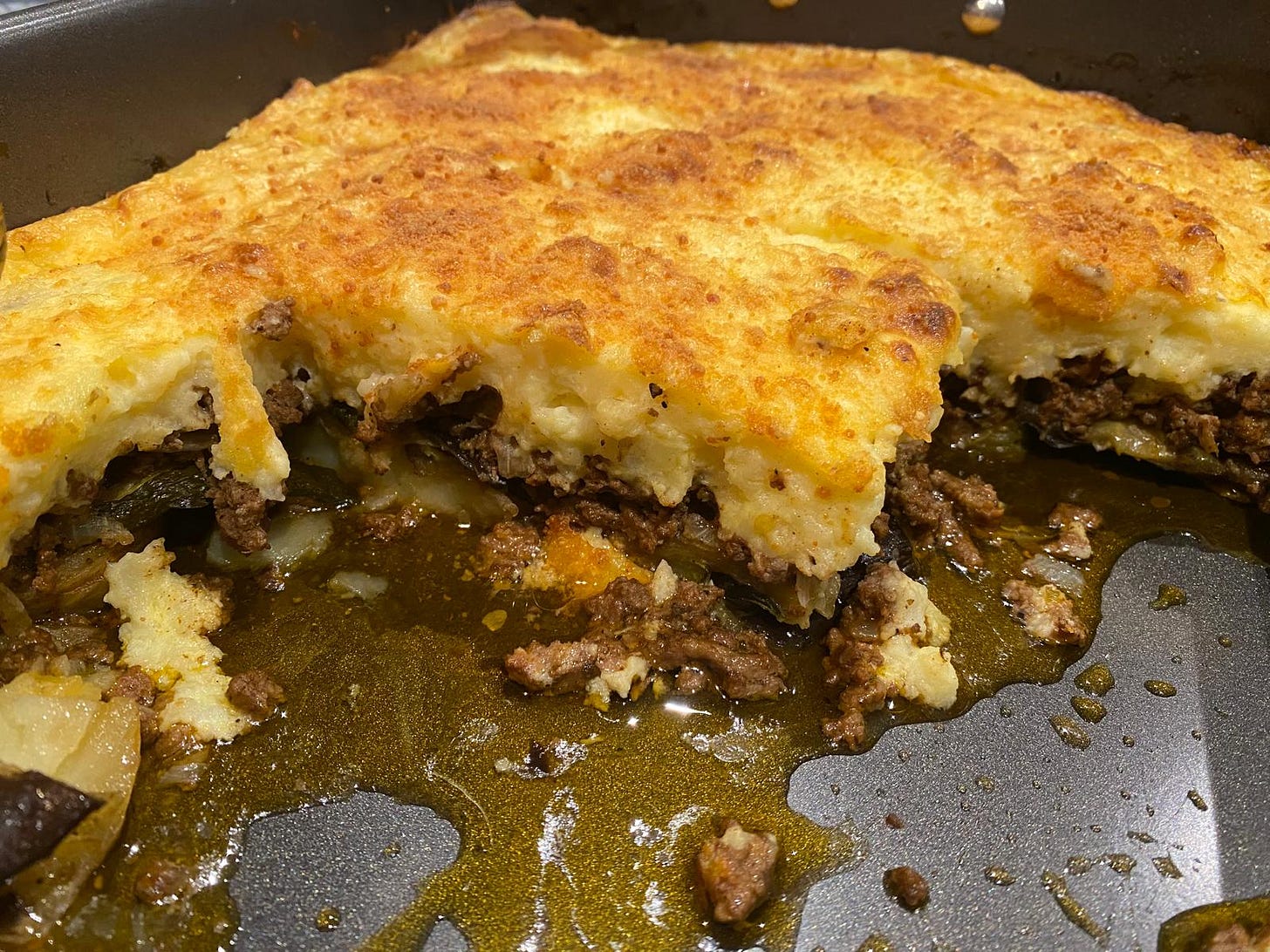Yiayia's Moussaka recipe
Sharing a family recipe and a sweet, intimate moment of connection cooking with my Yiayia.

First off, let’s learn a Greek word - μαγειρεύουμε - (pronounced mah-yee-rev-oo-meh), which means “we cook” or “we are cooking”. I love sharing recipes and using recipes shared with me, because it feels like we are cooking together (μαγειρεύουμε μαζί) across time and space.
Building on my last post, I wanted to share a recipe that my Yiayia (Greek grandmother) and her mum have made for decades - classic Greek moussaka (with her consent to share it, of course). Layers of roasted potatoes, eggplant/aubergine, zucchini/courgette, Bechamel sauce, and cheese. I honestly didn’t eat this much growing up as I was kind of a picky eater as a child and somehow didn’t like eggplant. I’d also never had it as fresh as I did in Greece, so my love affair with this dish has well and truly begun now.
Many recipes that are handed down from generation to generation tend to be taught in the kitchen, with access to all five senses, a loved one demonstrating how much of the ingredients to add and when. My Yiayia told me a story about one time she was teaching my (non-Greek) dad to make dolmades (stuffed grape leaves - the most involved Greek dish I’ve learned to make yet) when I was a kid, and he asked her how she knew how much filling to add - she didn’t weigh it or measure it or anything! She told him it’s just by feel, it’s just a rough spoonful like this, and it apparently drove him mad. Her recipes don’t have quantities, and she told me things like “add enough tomato sauce until it becomes a bit red”, and “add parsley until you start to be able to see some green bits like that”.
I wish I could be teaching you this recipe in my own kitchen, showing you how red is red and how many green bits is right, but this is my best attempt to share the love as wide as I can. If videos work for you, I made a reel showing this process which you can see here. I also added our timing throughout the recipe to show how long each stage took, which can help with preparing time-wise.
Yiayia’s Moussaka
Total prep & cooking time: ~1.5-2 hours
Ingredients
Eggplant
Zucchini
Ground beef - 1 kilo or more
Potatoes
Tomato paste OR tomato sauce
Parsley
Bay leaves
Cinnamon stick
Nutmeg
Pepper
For the Bechamel sauce:
Butter
Eggs
Milk
Flour (she used cake & pastry flour because she uses it for kourabiedes, but can use any kind of flour)
On top:
Grated cheese (kefalotiri, romano, or parmesan or any dry cheese)
Instructions
Start time: ~4:45pm
Slice eggplants and zucchini lengthwise and potatoes across the short side, all ~¼” thick
Pre-heat some baking dishes with olive oil in the oven (at 350-400*F), then lay the veggies and potatoes into the olive oil and put in the oven
Start cooking the meat (with no added oil) with 1 chopped onion, pepper, and some parsley (enough that “you can see the green”), a couple bay leaves, some ground nutmeg, a cinnamon stick (to be removed later), a little bit of tomato paste or tomato sauce (until it gives it a slightly red colour). Brown the meat and cook until all the juices are evaporated and it only has a little oil at the bottom. Once done, turn off the heat, and take out the cinnamon stick and bay leaf.
Once the veggies and potatoes have started to brown a little, flip them all and put them back in the oven
Time check: ~5:20
In a big pot, start melting a couple big chunks of butter
In a small pot, heat up a bunch of milk with ~4 eggs and whisk them in until all the eggs are broken. Stir occasionally to make sure it doesn’t stick to the bottom of the pot
When the veggies and potatoes are sufficiently browned, place a layer on the bottom of the baking dish of potatoes, then a mixed layer of zucchini & eggplant, then the browned beef
To finish the Bechamel sauce, add flour in large spoonfuls in to the warming milk until it starts to thicken up - not too thin, not too thick. Slightly clumpy still.
Then pour the Bechamel sauce on top of the beef, add some globs of butter over the top, and a sprinkling of grated cheese
Time check: 5:35 (moussaka going in the oven)
Put in the oven at 400*F, and cook until it starts to brown on top
Time check: 6:25 (moussaka coming out of the oven)
Take it out and let it cool for a few minutes before cutting into it
Learning these ancestral recipes of my family’s heritage helps me feel connected to something greater than myself. The first time my partner and I make moussaka ourselves, we’ll give her a call and it’ll make her so happy to know she’s passed that on to us. In an age of fast, ultra-processed food and treating food as only as good as its caloric value, creating a multi-step meal like this from scratch is becoming somewhat of a lost art, unless some of us make the effort to learn and continue to pass it on. So, if you wish, μαγειρεύουμε μαζί. We cook together.





